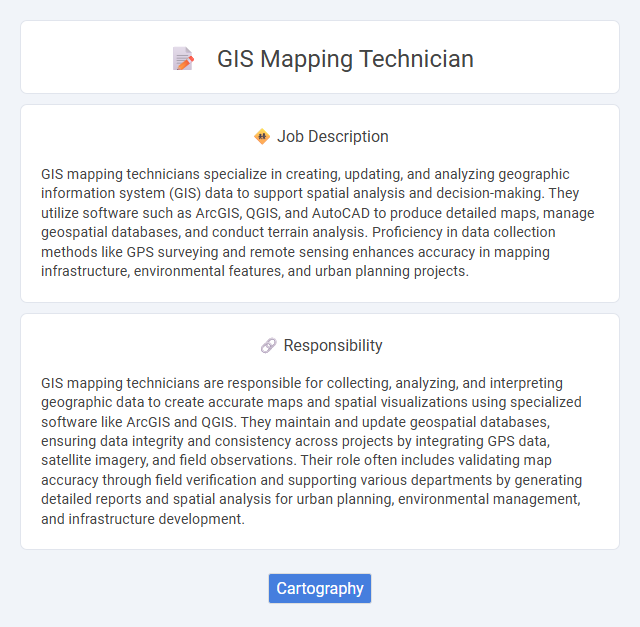
GIS mapping technicians specialize in creating, updating, and analyzing geographic information system (GIS) data to support spatial analysis and decision-making. They utilize software such as ArcGIS, QGIS, and AutoCAD to produce detailed maps, manage geospatial databases, and conduct terrain analysis. Proficiency in data collection methods like GPS surveying and remote sensing enhances accuracy in mapping infrastructure, environmental features, and urban planning projects.
Individuals with strong attention to detail and an aptitude for technology are likely suitable for a GIS mapping technician role, as the job requires precise data collection and analysis. Candidates who prefer structured tasks and have an interest in geography or spatial data may find the position aligns well with their skills and interests. However, those uncomfortable with prolonged computer use or complex software might find this job less suitable.
Qualification
A GIS mapping technician requires proficiency in geographic information systems (GIS) software such as ArcGIS and QGIS, along with a strong background in cartography, spatial analysis, and data management. Technical qualifications often include an associate or bachelor's degree in geography, environmental science, or computer science, complemented by certifications like GISP (Geographic Information Systems Professional). Strong skills in GPS data collection, remote sensing, and database management enhance job performance and career advancement opportunities in this field.
Responsibility
GIS mapping technicians are responsible for collecting, analyzing, and interpreting geographic data to create accurate maps and spatial visualizations using specialized software like ArcGIS and QGIS. They maintain and update geospatial databases, ensuring data integrity and consistency across projects by integrating GPS data, satellite imagery, and field observations. Their role often includes validating map accuracy through field verification and supporting various departments by generating detailed reports and spatial analysis for urban planning, environmental management, and infrastructure development.
Benefit
GIS mapping technician roles likely offer benefits such as opportunities for skill development in geospatial technologies and data analysis. Employees may experience a positive impact on career advancement due to the growing demand for geographic information systems expertise. Access to cutting-edge mapping tools and collaborative projects could enhance job satisfaction and professional networking.
Challenge
GIS mapping technician roles likely demand precise spatial data analysis and the ability to troubleshoot complex mapping software issues. Challenges may arise from continuously updating geographic information systems to reflect real-time changes accurately. Adapting to evolving technology and ensuring data accuracy under tight deadlines are also probable difficulties in this field.
Career Advancement
GIS mapping technicians gain valuable skills in spatial data analysis, cartography, and geographic information systems software, creating a strong foundation for career growth. Opportunities for advancement often include roles such as GIS analyst, GIS developer, or project manager, with increased responsibilities in data modeling, system customization, and strategic planning. Continuous learning and certification in advanced GIS technologies significantly enhance promotion prospects within urban planning, environmental management, and utility sectors.
Key Terms
Cartography
GIS mapping technicians specializing in cartography utilize advanced geospatial software to design and create detailed maps for various applications, including urban planning, environmental management, and infrastructure development. Their expertise in spatial data analysis, map projections, and digital visualization ensures accurate representation of geographic information tailored to client needs. Proficiency in tools like ArcGIS, QGIS, and AutoCAD enables these technicians to produce high-quality, data-driven cartographic products that support decision-making processes.
 kuljobs.com
kuljobs.com